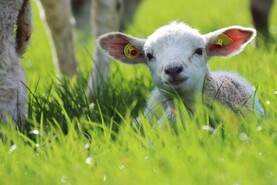A recent study led by Sligo Institute of Technology and the University of British Columbia concluded that the nitrogen cycle was altered by Bronze Age farming. Nitrogen, a critical element for life, is constantly recycled between the atmosphere, land and oceans.
The study, titled Anthropogenic changes to the Holocene nitrogen cycle in Ireland, showed that intense agriculture and deforestation had effects on soil composition and livestock nutrition. It was carried out through examining animal bones from 90 sites across Ireland. The difference in nutrient intake was analysed from the composition of the bones.
According to the research, a tipping point was reached when humans moved from living with nature to significantly affecting the nitrogen cycle.
Farming practices
Dr Fiona Beglane, zoo-archaeology lecturer at Sligo IT, told the Irish Farmers Journal that a loose rotation of crops and grazing may have been implemented during the Bronze age over 3,000 years ago. Livestock would have been kept near dwellings in the winter while arable crops would have been near dwellings during the summer. This would have increased nutrients in the soil as animals defecated on land which would be subsequently used for crops.
As populations increased, so did agricultural practices and we began to change the environments we live in
Beglane said that humans had little effect on the nitrogen levels in soil before the Bronze Age. As populations increased, so did agricultural practices and we began to change the environments we live in.
Soil was affected by ploughing, increased use of arable crops and grazing, causing lasting impacts as agriculture intensified. Eric Guiry from the University of British Columbia, the lead author of the study, explained that while “it is widely accepted we have always had an effect on our surroundings, finding early evidence of lasting changes is rare”.
The results of the study have global implications. While specific to Ireland, the findings can be applied anywhere where the landscape was altered for agriculture. They have significant potential to act as a backdrop for future research in this area.
Read more
Milk solids drive cashflow in Wicklow
Straw scarcity to bite
Less nitrogen for more clover?
A recent study led by Sligo Institute of Technology and the University of British Columbia concluded that the nitrogen cycle was altered by Bronze Age farming. Nitrogen, a critical element for life, is constantly recycled between the atmosphere, land and oceans.
The study, titled Anthropogenic changes to the Holocene nitrogen cycle in Ireland, showed that intense agriculture and deforestation had effects on soil composition and livestock nutrition. It was carried out through examining animal bones from 90 sites across Ireland. The difference in nutrient intake was analysed from the composition of the bones.
According to the research, a tipping point was reached when humans moved from living with nature to significantly affecting the nitrogen cycle.
Farming practices
Dr Fiona Beglane, zoo-archaeology lecturer at Sligo IT, told the Irish Farmers Journal that a loose rotation of crops and grazing may have been implemented during the Bronze age over 3,000 years ago. Livestock would have been kept near dwellings in the winter while arable crops would have been near dwellings during the summer. This would have increased nutrients in the soil as animals defecated on land which would be subsequently used for crops.
As populations increased, so did agricultural practices and we began to change the environments we live in
Beglane said that humans had little effect on the nitrogen levels in soil before the Bronze Age. As populations increased, so did agricultural practices and we began to change the environments we live in.
Soil was affected by ploughing, increased use of arable crops and grazing, causing lasting impacts as agriculture intensified. Eric Guiry from the University of British Columbia, the lead author of the study, explained that while “it is widely accepted we have always had an effect on our surroundings, finding early evidence of lasting changes is rare”.
The results of the study have global implications. While specific to Ireland, the findings can be applied anywhere where the landscape was altered for agriculture. They have significant potential to act as a backdrop for future research in this area.
Read more
Milk solids drive cashflow in Wicklow
Straw scarcity to bite
Less nitrogen for more clover?






 This is a subscriber-only article
This is a subscriber-only article











SHARING OPTIONS: